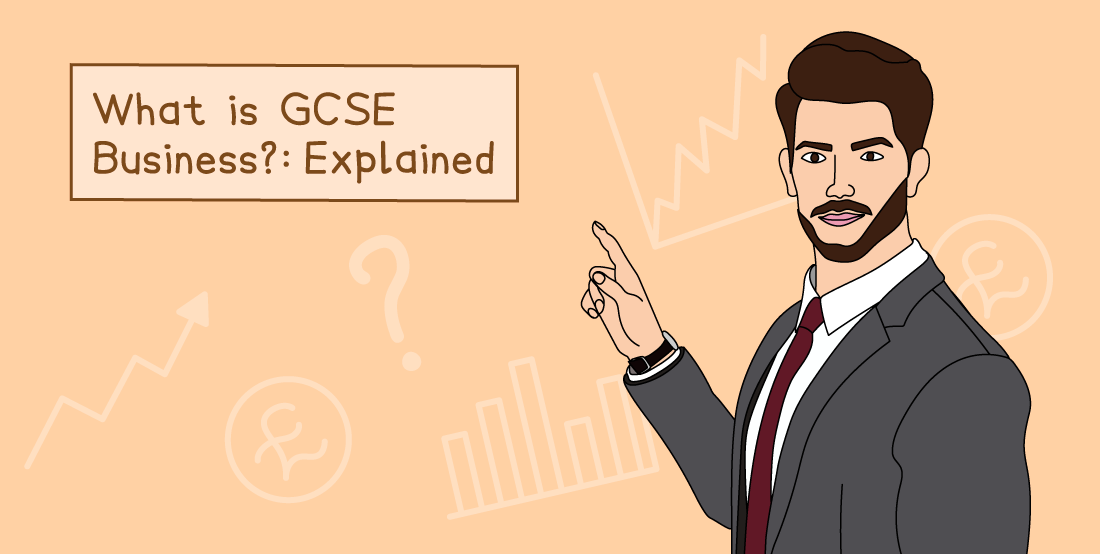Contents
- 1. What is GCSE Business?: Quick Summary
- 2. Why Study Business at GCSE?
- 3. What Does GCSE Business Cover?
- 4. How is GCSE Business Assessed?
- 5. What Are the Different Assessment Objectives?
- 6. What Skills Will Students Learn?
- 7. GCSE Business Exam Boards
- 8. Top Tips for Success
- 9. Frequently Asked Questions about GCSE Business
- 10. Get a 9 with Save My Exams
This article is a complete guide to GCSE Business, explaining what the subject involves and how it’s assessed. You’ll learn about key topics like marketing, finance, operations, human resources, and business activity. The course focuses on how businesses work, make decisions, and adapt to challenges, helping you understand the business world.
It explains how exams are based on real-life case studies, testing your ability to recall key concepts, apply knowledge, and evaluate business challenges. With tips for success, the guide helps you approach exams with confidence.
GCSE Business also develops essential skills like problem-solving, teamwork, decision-making, and financial literacy, which are valuable for any career or further study. The article answers common questions, such as “Is GCSE Business hard?” and “What can it lead to?” By reading it, you’ll discover why this course is engaging, practical, and a great choice for your future.
What is GCSE Business?: Quick Summary
GCSE Business is a qualification for students aged 14-16. It covers key areas like marketing, finance, human resources, and operations. The course helps you develop practical skills like problem-solving, decision-making, and financial awareness. It’s a great choice if you’re curious about how businesses succeed or want to explore a career in business, management, or even start your own company. It also builds skills that are useful for any career or further study.
Why Study Business at GCSE?
GCSE Business is a brilliant subject if you’re interested in what makes businesses work. You’ll learn about topics like marketing, managing people, and handling money. These are fascinating areas that show you how companies grow and succeed.
One of the best features about this course is how practical it is. You’ll pick up skills like teamwork, problem-solving, and planning—skills that are valuable no matter what career you choose. You’ll also study real-life examples of businesses, making the lessons feel relevant and interesting.
GCSE Business is also a smart choice for your future. The knowledge and skills you gain can lead to many careers, from finance to marketing, or prepare you for further study. Whether you want to manage a team, run a company, or simply understand how businesses work, this subject is a great starting point.
What Does GCSE Business Cover?
The course is packed with useful topics that introduce you to how businesses operate. While the exact content varies by exam board, all GCSE Business courses cover these key areas:
Business Activity
This part looks at why businesses exist, how they are set up, and the role of entrepreneurs. You’ll also learn about different types of business ownership, like sole traders and partnerships, and how businesses decide where to operate.
Marketing
Discover how companies attract and keep customers using tools like market research, the marketing mix (product, price, place, promotion), and customer segmentation. Marketing is all about understanding what customers want and how to meet their needs.
Operations
This section focuses on how businesses make products or deliver services. You’ll learn about things like production methods, quality control, and the importance of good customer service.
Finance
Financial literacy is a key part of the course. You’ll learn to calculate revenue, costs, and profit, as well as how businesses manage their money using tools like cash flow forecasts.
Human Resources
This part looks at how businesses recruit, train, and motivate employees. You’ll study things like organisational structures, communication, and how to keep staff happy and productive.
The course balances theory with practical knowledge, helping you understand how businesses succeed and preparing you for further study or careers in the business world.
How is GCSE Business Assessed?
GCSE Business is assessed through two written exams at the end of the course. These exams include a mix of question types, such as multiple-choice, short-answer, and longer, detailed responses.
Most questions are based on case studies, which present real-life business scenarios. For example, you might read about a small business trying to grow or a company launching a new product. You’ll need to analyse the information, identify problems, and suggest solutions using your business knowledge. This makes the exams engaging and tests how well you can apply what you’ve learnt.
What Are the Different Assessment Objectives?
Your exam performance is measured across three main objectives:
AO1: Knowledge and Understanding
This objective assesses how well you know key business terms, concepts, and theories. For example, you might be asked to "Define profit" or "Describe two advantages of franchising." These questions focus on recalling what you've learnt.AO2: Application
This objective tests whether you can apply your knowledge to real-world situations. For instance, you might need to explain how a café could use social media to attract more customers or how economies of scale could help a multinational business lower its average costs.AO3: Analysis and Evaluation
This objective focuses on breaking down business problems and making well-reasoned recommendations. You might be asked to "Evaluate whether a company should expand into a new market" or "Analyse the impact of a price increase on customer loyalty." These questions require balanced arguments, supported by evidence, and a clearly justified conclusion.
By practising these skills and becoming familiar with case studies, you’ll feel more confident tackling the exams.
What Skills Will Students Learn?
GCSE Business isn’t just about learning facts—it’s about building skills that will help you in the future. Here’s what you’ll gain:
Business Knowledge
You’ll develop a strong understanding of key areas like marketing, finance, and human resources, giving you a great foundation for further study or careers in business.
Critical Thinking
You’ll learn to analyse problems and make decisions, skills that are useful in any job.
Application of Knowledge
The course teaches you to connect theory to real-world situations, which is important for solving practical problems.
Teamwork and Communication
Group activities and discussions will help you work effectively with others and share ideas clearly.
Financial Literacy
Learning about profit, costs, and cash flow will help you manage money, both professionally and personally.
Entrepreneurial Thinking
By studying topics like business planning, you’ll develop creativity and an innovative mindset, useful for starting your own business or bringing new ideas to the workplace.
GCSE Business Exam Boards
There are three main exam boards for GCSE Business: AQA, Edexcel, and OCR. While they all cover similar content, their focus and structure differ slightly.
AQA: The course covers business activity, marketing, operations, finance, and human resources. It’s assessed through two exams, each lasting 1 hour and 45 minutes.
Edexcel: This course focuses on small business and business growth. The two exams, each 1 hour and 30 minutes, are slightly shorter, and there’s an emphasis on entrepreneurship.
OCR: OCR’s course also covers business activity, marketing, operations, and finance. Like AQA, the exams last 1 hour and 30 minutes each.
Each exam board offers a well-rounded course, so the choice often depends on your school.
Top Tips for Success
1. Master Keywords and Command Words
Understand business terms like "economies of scale" and "cash flow." Learn how to answer questions with command words like evaluate and analyse to show exactly what the examiner is looking for.
2. Use Real-Life Examples
Make your answers stand out by linking them to real-world businesses. For example, explain how companies like Amazon use customer data to improve their services.
3. Plan Your Answers
For longer questions, structure your answers clearly: start with an introduction, present balanced arguments, and end with a strong conclusion. Practising this will help you write well-organised responses.
Frequently Asked Questions about GCSE Business
Is GCSE Business hard?
It’s not hard if you stay organised and keep up with your studies. The content is straightforward, and the case studies help you understand how to apply what you’ve learnt. With regular revision, you’ll find it manageable.
Is GCSE Business easy to pass?
Yes, if you put in the effort. The course is designed to be accessible, and the real-life examples make it interesting. As long as you understand the key concepts and practise applying them, you should do well.
What does GCSE Business provide?
It gives you a great foundation for further study, like A-Levels in Business or Economics. It also opens up career opportunities in marketing, management, finance, and entrepreneurship.
What are the benefits of GCSE Business?
The course develops practical skills like financial literacy, decision-making, and problem-solving. It also gives you an understanding of how businesses work, which is useful in any career.
What can GCSE Business lead to?
It can lead to A-Level study, apprenticeships, or careers in areas like marketing, human resources, and finance. If you want to start your own business, this course is a great first step.
Is GCSE Business important?
Yes! Even if you don’t pursue a career in business, the skills you learn—like critical thinking and money management—are useful in everyday life.
Get a 9 with Save My Exams
Save My Exams offers a range of resources to help students excel in GCSE Business, including revision notes, flashcards, past papers, and exam-style questions that are marked for you. These materials are aligned with the specific exam boards, providing targeted support for different topics like marketing, finance, and operations.
Revision notes break down complex concepts into manageable sections, while past papers allow students to practice under timed conditions. Additional exam-style questions help students become familiar with the types of questions they might face.
GCSE Business Revision Resources
References
Business GCSE Subject Content: UK Government
All You Need to Know About Taking a Business Studies GCSE: Springpod
Business GCSE Overview: Superprof
Sign up for articles sent directly to your inbox
Receive news, articles and guides directly from our team of experts.

Share this article



 written revision resources that improve your
written revision resources that improve your